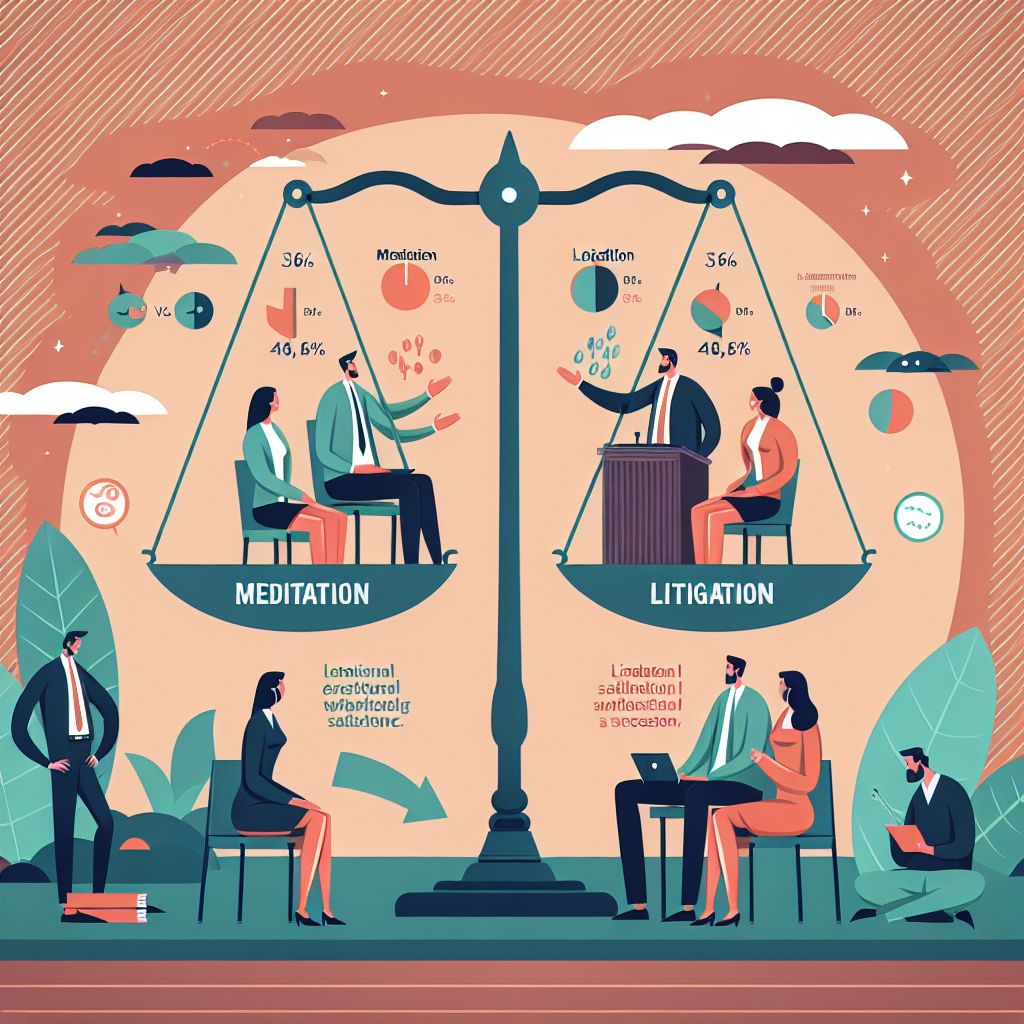Emotional Impact of Mediation vs. Litigation

Emotional Well-Being: Mediation vs. Litigation
The Importance of Emotional Well-Being in Legal Proceedings
Legal disputes can be emotionally taxing experiences. Whether it is a divorce, a business conflict, or a personal injury case, the high stakes and adversarial nature of litigation can lead to heightened emotions, stress, and anxiety for all parties involved. In fact, the emotional toll of a legal battle can often outweigh the financial costs and time commitment.
Defining Mediation and Litigation
When faced with a legal dispute, individuals have two main options for resolving their conflict: mediation and litigation. Mediation is a form of alternative dispute resolution (ADR) where a neutral third party, known as a mediator, helps the parties involved in the dispute to communicate and reach a mutually acceptable agreement. On the other hand, litigation involves taking the case to court and having a judge or jury make a final decision.
Understanding the Differences between Mediation and Litigation
There are several key differences between mediation and litigation. In mediation, the parties have more control over the outcome and can work together to find a solution that meets their needs. In contrast, litigation can be more adversarial and often leads to a winner and loser mentality. Additionally, mediation is typically a more private and confidential process, whereas litigation takes place in a public courtroom. Finally, mediation tends to be a faster and less costly process compared to litigation, which can drag on for months or even years.
The Effects of Emotional Stress in Litigation
The adversarial nature of litigation can take a toll on all parties involved. The constant conflict, uncertainty, and lack of control can lead to heightened stress, anxiety, and even depression. This emotional distress can also affect the quality of life and relationships of those involved, as well as their ability to perform at work or school. For some individuals, the emotional strain of litigation can have long-term impacts on their mental health.
How Mediation Prioritizes Emotional Well-Being
In contrast to litigation, mediation prioritizes the emotional well-being of the parties involved. As a non-adversarial process, mediation promotes open communication and understanding between the parties, which can help to reduce conflict and manage emotions. Additionally, the confidentiality of mediation allows individuals to share their feelings and concerns without fear of it being used against them in court. The mediator also ensures that all parties are heard and their needs are taken into consideration during the negotiation process.
The Role of Communication in Mediation and Litigation
Communication is key in both mediation and litigation, but the approach is different. In mediation, the parties are encouraged to listen to each other and express their perspectives in a respectful and constructive manner. This open dialogue can help to improve understanding and find common ground. In contrast, litigation often involves more formal and structured communication between the parties and their lawyers, which can lead to a breakdown in communication and further escalate emotions.
Maintaining Control and Empowerment in Mediation
One of the major benefits of mediation is that it allows individuals to maintain control and empowerment in the decision-making process. In litigation, the outcome is ultimately in the hands of a judge or jury, and the parties have little say in the final decision. This lack of control can add to the emotional burden of the process. In mediation, the parties work together to find a solution that works for them, which can lead to a more satisfactory and empowering outcome.
The Cost of Emotional Well-Being in Litigation
In addition to the financial costs of litigation, there is also a significant emotional cost. The stress and strain of a legal battle can take a toll on mental and emotional well-being, leading to potential long-term effects. This emotional cost is often overlooked when individuals are considering their options for resolving a conflict, but it is an important factor to consider.
The Long-Term Impact of Emotional Well-Being in Legal Outcomes
The emotional well-being of individuals involved in a legal dispute can also have a direct impact on the outcome. Emotions can cloud judgment and lead to irrational decisions, which can ultimately result in a less satisfactory outcome in court. In mediation, the focus on managing emotions and finding a mutually beneficial solution can lead to more positive outcomes for all parties involved.
Why Choosing Mediation Can Lead to Better Emotional Well-Being and Resolution
In conclusion, the emotional impact of mediation and litigation can have a significant effect on the overall outcome of a legal dispute. While litigation may seem like the only option in some cases, it is important to consider the toll it can take on one’s emotional well-being. Mediation offers a more collaborative and supportive approach to conflict resolution, which can lead to better emotional outcomes for all parties involved. By prioritizing emotional well-being and choosing mediation, individuals can not only find a more satisfactory resolution to their dispute, but also avoid the negative emotional impact of a drawn-out and adversarial legal battle.



